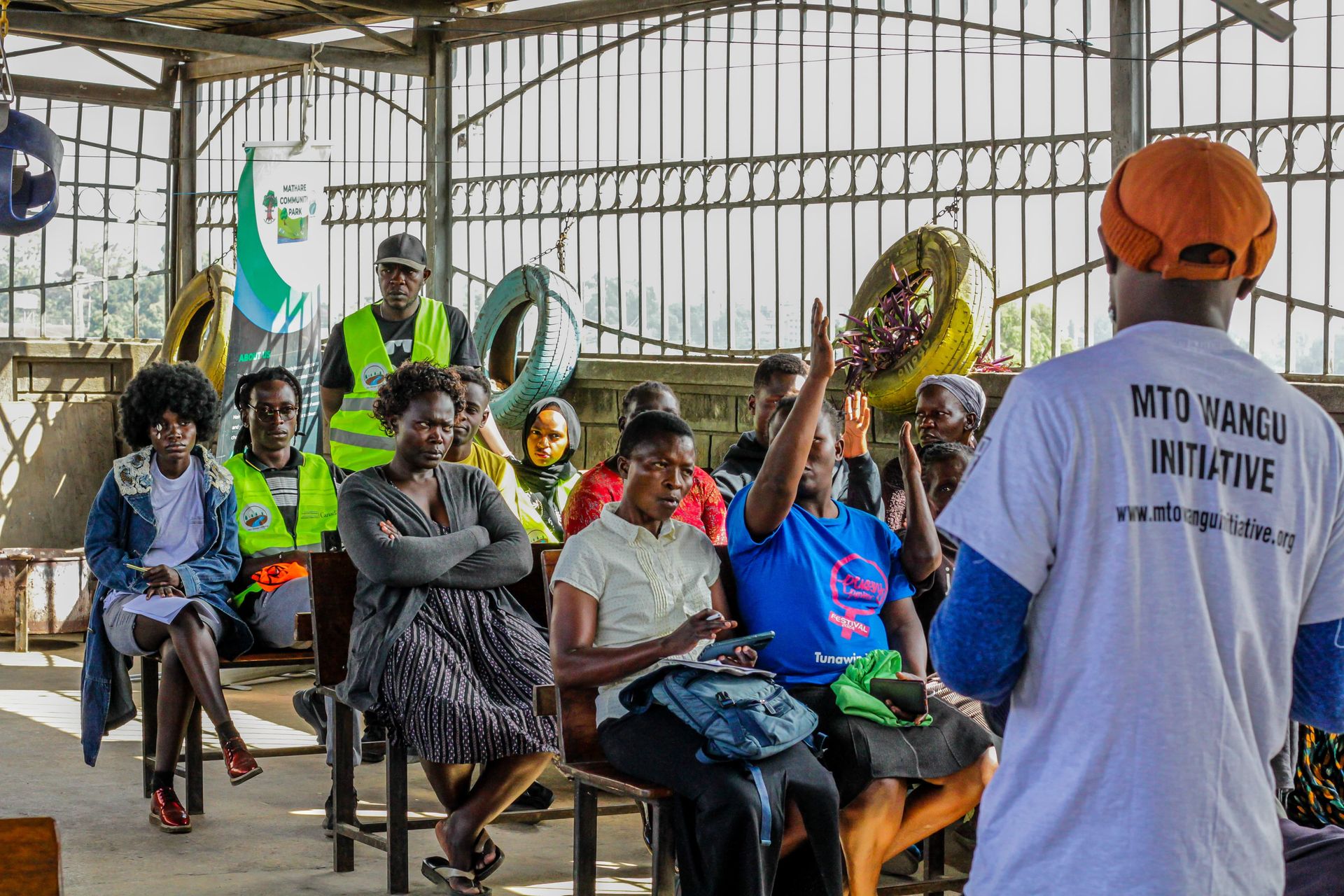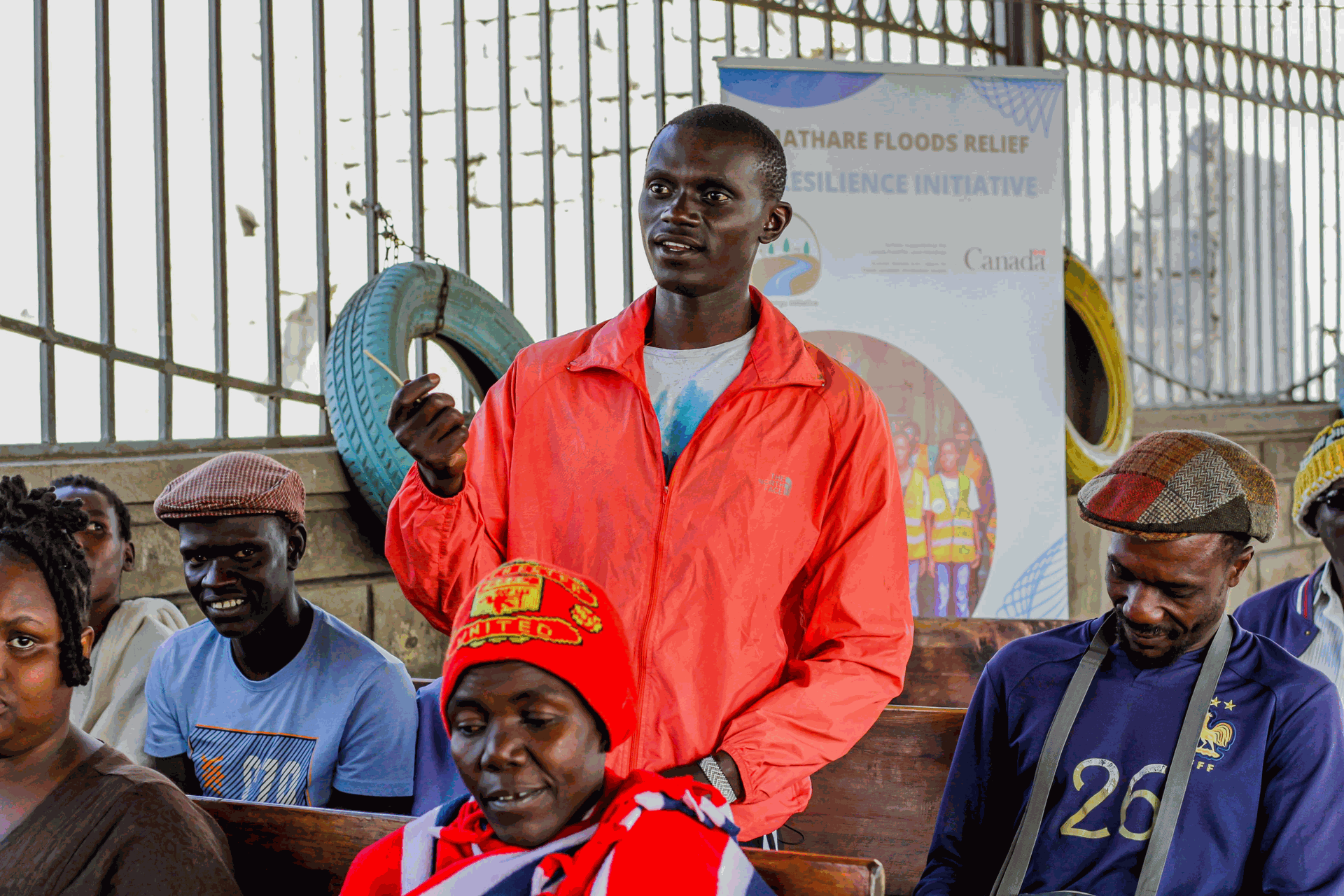A Community-Driven Approach to Disaster Resilience
On January 17, 2025, community members, grassroots organizations, and key stakeholders gathered for the Flood disaster response Dialogue, a landmark conversation on how the community can take ownership of disaster preparedness and environmental conservation.
While the government plays a crucial role in developing infrastructure and policies, real change begins at the community level. The resilience of Mathare against future floods will not be determined solely by external interventions but by the daily actions, collective decisions, and preparedness of its people.

This dialogue was designed to shift the narrative from dependency to community-driven solutions. Residents shared lived experiences, identified risks, and co-created practical strategies that do not rely entirely on outside intervention but instead leverage grassroots mobilization, local knowledge, and small everyday actions that build long-term resilience.
The goal of this report is to capture the energy, insights, and commitments made during this powerful dialogue—not just as recommendations, but as a roadmap for action that every Mathare resident can take ownership of.
Key Discussion Points & Community-Led Actions

- Understanding Flood Risks & Taking Precautionary Measures
Mathare’s flood problem is not just about heavy rains—it’s about how we prepare before the rains come. Poor drainage, waste dumping, and settlement patterns are major contributors.
✅ Community Actions:
- Organize neighborhood-based cleanups to keep drainage systems clear before rainy seasons.
- Form flood watch groups to monitor rising water levels and issue early warnings.
- Establish safe evacuation routes with community maps marking high-risk zones and safe shelters.
💡 What Mto Wangu Initiative Will Do:
➡️ Facilitate flood preparedness training sessions in schools and local groups.
➡️ Develop community flood alert networks using SMS and social media updates.
2. Rebuilding After Demolitions: A More Sustainable Future
Following government-led demolitions of homes and sanitation facilities, Mathare faces the challenge of rebuilding in a way that prioritizes safety and sustainability.
✅ Community Actions:
- Push for transparent resettlement plans that involve residents in decision-making.
- Advocate for low-cost, flood-resistant housing models in collaboration with local builders.
- Promote green construction techniques, including raised foundations and proper drainage.
💡 What Mto Wangu Initiative Will Do:
➡️ Engage with urban planners to push for community-informed housing solutions.
➡️ Advocate for temporary, flood-resistant shelter alternatives for displaced families.
3. Environmental Conservation: Healing the Mathare River
The Mathare River is both a lifeline and a threat—its pollution and degradation have worsened flooding, but if restored, it could protect the community from future disasters.
✅ Community Actions:
- Launch community-led tree planting programs to stabilize riverbanks and reduce erosion.
- Introduce waste segregation and recycling initiatives to reduce pollution.
- Support eco-friendly businesses that incentivize clean environments, such as urban farming and plastic recycling enterprises.
💡 What Mto Wangu Initiative Will Do:
➡️ Organize a Mathare River Restoration Campaign, bringing together residents, youth groups, and local businesses.
➡️ Partner with environmental experts to train community champions on sustainable waste management.
4. Supporting Families: Lost Documents & Mental Health Support
Floods take away more than homes—they disrupt lives, leaving families without IDs, school certificates, and other crucial documents. Additionally, the emotional trauma of losing everything in a disaster is often ignored.
✅ Community Actions:
- Set up support groups to assist residents with replacing lost documents.
- Train community volunteers in mental health first aid to offer psychological support.
- Organize grief counseling sessions to help affected families cope with loss.
💡 What Mto Wangu Initiative Will Do:
➡️ Partner with legal aid organizations to help families navigate document recovery.
➡️ Facilitate mental health awareness forums led by trained community counselors.
5. Building a Culture of Disaster Preparedness
Many residents admitted that they do not know what to do when floods hit—there is no formal training, no official emergency system, and no structured evacuation plan.
✅ Community Actions:
- Conduct disaster preparedness workshops in schools, churches, and community centers.
- Develop a community response team trained in first aid, emergency response, and evacuation drills.
- Create a mobile alert system that provides real-time updates on flood risks.
💡 What Mto Wangu Initiative Will Do:
➡️ Develop community-based disaster training programs to enhance preparedness.
➡️ Establish an SMS flood alert system in partnership with local tech innovators.